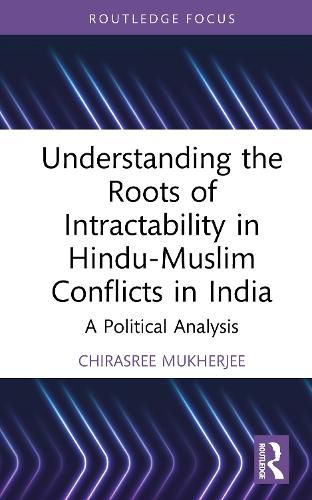Readings Newsletter
Become a Readings Member to make your shopping experience even easier.
Sign in or sign up for free!
You’re not far away from qualifying for FREE standard shipping within Australia
You’ve qualified for FREE standard shipping within Australia
The cart is loading…






Understanding the Roots of Intractability in Hindu-Muslim Conflicts in India examines why some political conflicts, especially those involving religion, prove difficult to resolve, utilising the case study of religious conflicts among Hindus and Muslims in India.
Traditional conflict resolution techniques such as negotiation and mediation often fail to manage or resolve such conflicts and the existing literature often overlooks the nuances within religious conflicts. This book deepens understanding of the roots of intractable conflicts, analyzing five decades of conflicts between Hinduism and Islam in India, paving the way for more successful peacebuilding and conflict management. The author disaggregates religious conflicts into four types - Conflicts over Sacred Sites, Dietary Restrictions, Religious Festivities and Other. Using the Varshney-Wilkinson Dataset on Hindu-Muslim Violence in India (1950-1995) and Mitra and Ray's (2014) extension of the same dataset (1996-2000), the book argues that compared to the latter three types of conflict and non-religious conflicts, any conflict involving sacred sites results in greater intensity and duration and, hence, will be the most intractable. It further demonstrates the varied effects of each conflict type on conflict intractability.
This book will appeal to scholars and students of political science, religious studies, and conflict and security studies.
$9.00 standard shipping within Australia
FREE standard shipping within Australia for orders over $100.00
Express & International shipping calculated at checkout
Understanding the Roots of Intractability in Hindu-Muslim Conflicts in India examines why some political conflicts, especially those involving religion, prove difficult to resolve, utilising the case study of religious conflicts among Hindus and Muslims in India.
Traditional conflict resolution techniques such as negotiation and mediation often fail to manage or resolve such conflicts and the existing literature often overlooks the nuances within religious conflicts. This book deepens understanding of the roots of intractable conflicts, analyzing five decades of conflicts between Hinduism and Islam in India, paving the way for more successful peacebuilding and conflict management. The author disaggregates religious conflicts into four types - Conflicts over Sacred Sites, Dietary Restrictions, Religious Festivities and Other. Using the Varshney-Wilkinson Dataset on Hindu-Muslim Violence in India (1950-1995) and Mitra and Ray's (2014) extension of the same dataset (1996-2000), the book argues that compared to the latter three types of conflict and non-religious conflicts, any conflict involving sacred sites results in greater intensity and duration and, hence, will be the most intractable. It further demonstrates the varied effects of each conflict type on conflict intractability.
This book will appeal to scholars and students of political science, religious studies, and conflict and security studies.